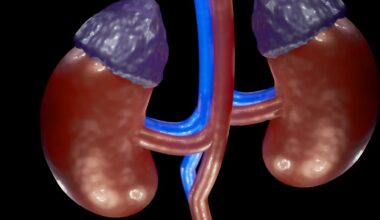Early Warning Signs of Eating Disorders: A Parent’s Guide
Being vigilant about your child’s health is crucial, especially regarding eating disorders. These conditions often emerge in silence and can have significant long-term effects, both psychologically and physically. Therefore, as a parent, being aware of the early warning signs can make a considerable difference. It is essential to observe changes in eating behaviors, body image issues, or emotional distress. Parents should cultivate an environment where sharing feelings is normalized, so kids feel safe to discuss their struggles. Common indications include extreme dietary restrictions, excessive exercising, and noticeable fluctuations in weight. Utmost awareness and prompt actions can prevent further complications. Early intervention is the key! By educating yourself on these behaviors, you can take proactive measures. Maintain regular dialogues with your child, establish meal routines, and offer unconditional love and support. Being proactive may help to navigate these challenges and provide necessary assistance. Your awareness can lead to early detection and treatment, which can ultimately save your child from severe consequences. Always foster open communication, which is vital in understanding their feelings and motivations.
Identifying emotional changes is essential when monitoring for signs of eating disorders. Often, these issues are intertwined with psychological factors that affect a child’s mental well-being. Sudden mood swings, irritability, or withdrawal from social activities are critical signals that must not be ignored. Eating disorders frequently arise during periods of increased stress or transitional life events, making emotional support vital. Encourage your child to express their feelings and reassure them that it’s okay to seek help when needed. Watching your child experience a significant lack of self-esteem can be alarming; they may express dissatisfaction with their appearance or align themselves with extreme beauty standards. These unrealistic perceptions can stem from societal pressures and media influence, often exacerbating their struggles. It’s imperative to cultivate a healthy body image at home, which involves reinforcing self-worth beyond physical attributes. Open discussions about real beauty and healthy living are essential to counteracting negative influences. Ensure they understand that their value is not determined by weight or size. Implementing positive affirmations and surrounding them with supportive relationships can strengthen their self-image. A strong support system, especially during developmental stages, is crucial for minimizing the potential progression of eating disorders.
Changes in Eating Habits
Sudden alterations in eating patterns can provide significant clues pointing towards potential eating disorders. This could manifest as overeating, under-eating, or developing strict food rituals. Watch for symptoms like skipping meals, obsessing over portion sizes, or eliminating entire food groups. When children exhibit these behaviors, it’s often a cry for help stemming from deeper issues. Be aware that these eating behaviors may also become increasingly secretive. Parents should remain observant of any evasiveness or changes in social dining habits. For instance, if your child avoids group meals or becomes anxious about eating in public settings, these habits warrant further investigation. Openly discussing meals and maintaining a healthy food culture can alleviate stress related to eating. Encourage the enjoyment of food together as a family to foster positive relationships with meals. Providing nutritious options while respecting their preferences is important, but manipulation or force-feeding can lead to pushback. Positive experiences around food will help build better associations and ease anxiety. Integrating efforts to normalize eating and communicating openly can significantly influence their mental state and subsequent behaviors concerning food.
Physical changes also play a significant role in recognizing eating disorders. Parents may observe rapid fluctuations in their child’s weight or notice dramatic changes in their physical appearance. These signs may not only affect emotional health but can have profound physical consequences. Look for signs of fatigue, dizziness, or other physical ailments that may arise from inadequate nutrition. Frequent complaints of stomach issues or lethargy can point to larger concerns. Additionally, watch for changes in skin, hair, or dental health. Children with eating disorders might experience hair loss, brittle nails, or dental erosion due to malnutrition or excessive purging behaviors. These physical indicators signal potential psychological issues that may necessitate intervention. If parents observe consistent physical signs, it’s crucial to consult a medical professional who specializes in adolescent health and eating disorders. Maintaining regular check-ups can ensure any potential health deterioration is addressed promptly. Prioritize health over appearance, getting valuable guidance from healthcare providers who can offer holistic treatment plans tailored for children struggling with these concerns.
Social Withdrawal and Isolation
Social withdrawal is another critical early warning sign of eating disorders. Your child may distance themselves from friends or family, preferring solitude over social interactions. This behavior can stem from insecurities related to their body image or fear of judgment regarding their eating habits. When participating in social gatherings involves food, the anxiety may intensify, leading them to avoid these situations. If your child expresses reluctance to join family meals or social functions, take this as a significant warning signal. Encourage ongoing communication and ensure they know they can confide in you about their feelings. Creating a safe space for discussing concerns can positively influence their decision to engage in social activities. Additionally, engage them in hobbies or interests that foster interaction with peers, promoting a sense of normalcy. It’s essential to reinforce the understanding that they are not alone in their struggles. Seeking professional guidance from therapists specializing in adolescent issues can effectively bolster skills for managing anxiety and restoring social connections. Focusing on relationship-building helps improve emotional support networks, essential for recovery from eating disorders.
Building a solid foundation of trust is crucial for a supportive relationship with your child facing potential eating disorders. Parents can foster resilience by doing their best to remain calm throughout this journey. Remember, the goal is to create an environment in which your children feel loved and accepted, regardless of the changes they are experiencing. When addressing concerns about eating habits or body image, approach sensitive subjects with care, ensuring that they feel safe sharing their thoughts. Stay informed about eating disorders, procedures, and available support options to guide conversations more effectively. Encourage engagement in community or school activities emphasizing physical well-being, healthy self-image, and education. Programs fostering healthy living and positive relationships can significantly assist in preventing further complications. Be persistent in your efforts to establish open lines for dialogue even if your child resists or withdraws initially. Utilizing family meetings or group discussions can help emphasize collective support and strengthen relationships. Amid challenges, remember that overcoming these issues is feasible through patience, understanding, and encouragement. Your dedication to maintaining an open and supportive home can significantly influence your child’s path toward recovery.
Professional Help and Resources
Finding professional help is pivotal when you suspect your child may be struggling with an eating disorder. Early intervention can mitigate severe health risks and provide crucial support systems for recovery. Research and educate yourself on local resources, such as therapists specializing in eating disorders, support groups, and treatment programs, ensuring you understand available paths toward healing. Many organizations can offer guidance, such as the National Eating Disorders Association (NEDA), which provides invaluable information. Connecting with professionals knowledgeable in this area enables you to navigate the complexities of treatment approaches available. Family therapy or individual counseling may prove beneficial in restoring healthy family dynamics and encouraging communication. Don’t hesitate to reach out to schools; many institutions offer counseling services and programs addressing mental health challenges. Additionally, empower your child to take charge of their healing process by permitting involvement in choosing options that resonate with them. Validating their feelings and experiences while simultaneously exploring obtainable assistance creates an empowering environment. Ultimately, the goal is to establish a collaborative care approach focused on recovery, resilience, and fostering lasting well-being for your child.
Ultimately, being vigilant, proactive, and supportive can make a significant difference in navigating the complexities surrounding eating disorders. Emphasizing education about early warning signs can equip parents with tools to detect potential issues before they escalate. By fostering an encouraging atmosphere, your child is more likely to communicate openly regarding their feelings and food-related concerns. Keep in mind that recovery is often a journey, presenting ups and downs. Regularly checking in on your child’s emotional and physical state encourages visibility and reliability within your relationship. It’s essential to work collaboratively with healthcare providers to ensure continuing and appropriate care at every stage. Remember that you are not alone on this journey; countless families experience similar challenges. Rallying a support network among other parents or professionals can guide you through these tumultuous times and provide insights into coping mechanisms. Maintain a focus on promoting emotional well-being and healthy living habits at home. Let this journey be a collaborative effort, aimed not only at recovery but a long-term commitment to nurturing overall happiness. Prioritize mental health as much as physical health, as both are equally crucial for your child’s development and self-esteem.


